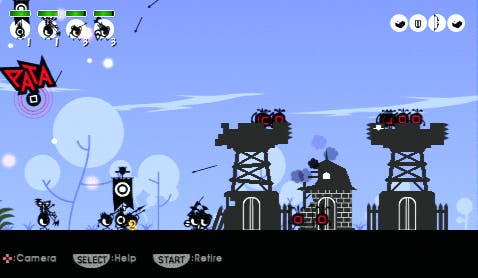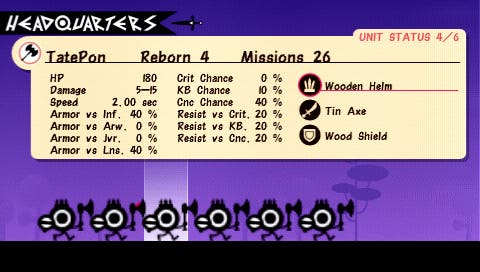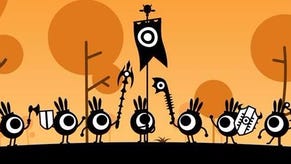Patapon
Take advantage of another quirky classic.
So yes, the obvious frame of reference is LocoRoco. There's that clean, crisp, 2D visual style, a similar cast of quirky little imps tumbling around the screen, and it's all accompanied by a joyous sort of shouty singing noise. That's not entirely surprising given that the two games have been developed by some of the same people, apparently. But actually, Patapon bears very little comparison to almost any other videogame (apart, perhaps, from the similarly odd collision of genres to be found in Odama). That's because it's a rhythm-action real-time strategy game, in which you perform the duties of a deity, guiding a tribe of warriors called Patapons to fight their way through the ranks of their enemies, the Zigoton, to find the end of the world.
The way it works is that you issue commands to your army of tribesmen by tapping out simple, predefined rhythms using the PSP's face buttons. Different rhythms make them perform different tasks as they advance across a horizontal, side-scrolling battlefield. The game is broken up across some 30 different missions, with the early stages introducing each new rhythm gradually. Starting off with just one type of drum, within a short while you and your tribesmen will discover new drums for each face button, allowing you to tap out new rhythms that correspond to new commands, such as advance, attack, defend and so on. Stringing together combinations of these commands triggers Fever mode, which, for as long as you can maintain it, spurs your little chaps on to ever greater feats of valour.

The result is a delicate balance between zoning out enough to keep the hypnotic beats racking up to reach Fever, and zoning in enough to focus on what's going on and where you need to direct your troops to do what. Thus, while you're trying to hold down a constant beat to rack up combos, you'll also be trying to time your attacks while working out how to conquer each level - right down to reading speech bubbles for clues (which - as a note for would-be importers - are all in Japanese until the US version comes out next month). Fortunately, those hypnotic beats are simple and trance-like, so controlling the game isn't as complicated as it might sound.
Nevertheless, the game does becomes pretty intricate pretty quickly, because, while there are only six different drumbeats to master, the customisation options for your army are enormous. First, you'll acquire various new troop types as the game progresses, adding the likes of archers, cavalry and axemen to the basic spearmen that you start off with. Second, you'll acquire various different types of item, from weapons and armour, to coins, meat and rocks with which to create and upgrade new units to build up your tribal army. Indeed, the densely packed stat screens that flash up before the start of each mission, full of various defensive percentages and critical hit chances and all that sort of stuff, provide a fairly good indication of the game's tactical complexities.

There are, however, further nuances to master. Environmental weather conditions play a small but significant part, such as scorching desert sands that prevent your tribesmen's progress, or winds that affect the range of your weapons. But you can master these conditions with various 'miracle' powers, such as the ability to call down rain to cool the earth, or change the wind direction to make your spears fly further. Then there are the adventure/puzzle elements to each mission, which require you to work out how to unlock new stages, and how to access the handful of mini-games that provide mission critical items.
And there's the biggest problem with Patapon: you'll spend much of the game replaying sections you've already done, either to rack up resources for your army or to find objects that are critical to later missions. The solution to many of the game's puzzles seems to be to replay an earlier mission again. Missions are essentially divided into three types: 'meat' levels, which are essentially hunting grounds that can be replayed as often as you like to gather resources to power up your army; 'enemy' levels, which are essentially showdowns with the Zigoton; and 'boss' levels, which are - you guessed it - boss levels. The problem is that replaying meat levels and boss levels is essential, so progress can feel quite slow - which is only made worse by the frustrations of having to wait for the steady but slow 4/4 beat to catch up before you can give your warriors a new command after making a mistake.

Still, the undeniable charm of the pata-pata-pata-pon chanting and the character design and so on goes a long way in overcoming this major flaw, as well as conquering the game's other minor niggles. The various chants and rhythms will be patapatapataponning their way round your head, bouncing off the inside of your skull for a long time after you switch the game off, and there's a simple but significant pleasure to be taken from the crazy tribal choir that gets going when you sustain a fever for a while.
And in the end, that's why LocoRoco is a useful comparison. Because whereas LocoRoco's effortless charm and stylistic verve compensated for an occasionally lightweight game design, in Patapon, a similar visual panache and lively effervescence compensates for an occasionally over-complex game design. So, to reiterate: while Patapon has got the same quirky sense of style and visual charm as its predecessor, it doesn't offer the same easy breezy gameplay. Instead, it offers an imposing amount of depth and a considerable amount of micromanagement. Which isn't necessarily a criticism - it's just that forewarned is forearmed, and if you're nuts about LocoRoco there's no guarantee that you'll go bonkers for Patapon, because it's complicated, and it can be frustrating. But then it can also be rewarding and yes, it's absolutely charming and that counts for a lot.


